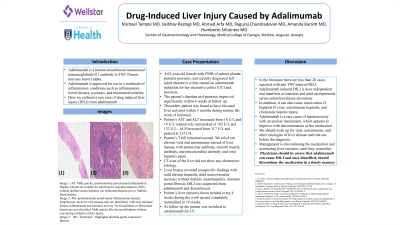Monday Poster Session
Category: Liver
P2606 - Drug-Induced Liver Injury Caused by Adalimumab
Monday, October 23, 2023
10:30 AM - 4:15 PM PT
Location: Exhibit Hall

Has Audio
- MT
Michael Temple, MD
Augusta University
Augusta, GA
Presenting Author(s)
Michael Temple, MD1, Raguraj Chandradevan, MD2, Vaibhav Rastogi, MD1, Humberto Sifuentes, MD1
1Augusta University, Augusta, GA; 2Medical College of Georgia at Augusta University, Augusta, GA
Introduction: Adalimumab is a human recombinant monoclonal immunoglobulin G1 antibody to TNF (Tumor necrosis factor) alpha. Adalimumab is approved for use in a multitude of inflammatory conditions such as inflammatory bowel disease, psoriasis, and rheumatoid arthritis. Here we outlined a rare case of drug induced liver injury (DILI) from adalimumab.
Case Description/Methods: A 62-year-old female with PMH of palmar plantar pustular psoriasis, and recently diagnosed left sided ulcerative colitis started on adalimumab induction for her ulcerative colitis (UC) and psoriasis. The patient’s diarrhea and psoriasis improved significantly within 6 weeks at follow up. Thereafter, patient was found to have elevated liver enzymes within 3 months during routine lab work of initiation. Patient’s AST and ALT increased from 16 U/L and 19 U/L respectively and peaked at 102 U/L and 132 U/L. ALP increased from 117 U/L at peaked at 233 U/L. Patient’s T bili remained normal. We ruled out chronic viral and autoimmune caused of liver disease with antinuclear antibody, smooth muscle antibody, and mitochondrial antibody and viral hepatitis panel. CT scan of the liver did not show any obstructive etiology. Liver biopsy revealed nonspecific findings with mild chronic hepatitis, mild macrovascular steatosis without definite steatohepatitis, minimal portal fibrosis. DILI was suspected from adalimumab and discontinued. Patient’s liver enzymes down trended every 4 weeks during the work up and completely normalized in 10 weeks. At follow up the patient was switched to ustekinumab for UC.
Discussion: In the literature there are less than 20 cases reported with anti TNF induced DILI. Adalimumab induced DILI is dose independent and manifests as transient and mild asymptomatic serum aminotransferase elevations. In addition, it can also cause reactivation of hepatitis B virus, autoimmune hepatitis, and cholestatic hepatic injury. Adalimumab is a rare cause of hepatotoxicity with an unclear mechanism, which appears to improve with discontinuation of the medication. We should work up for viral, autoimmune, and other etiologies of liver disease and rule out before the diagnosis. Management is discontinuing the medication and monitoring liver enzymes, until they normalize. Physicians should be aware that adalimumab can cause DILI and once identified, should discontinue the medication in a timely manner.
Disclosures:
Michael Temple, MD1, Raguraj Chandradevan, MD2, Vaibhav Rastogi, MD1, Humberto Sifuentes, MD1. P2606 - Drug-Induced Liver Injury Caused by Adalimumab, ACG 2023 Annual Scientific Meeting Abstracts. Vancouver, BC, Canada: American College of Gastroenterology.
1Augusta University, Augusta, GA; 2Medical College of Georgia at Augusta University, Augusta, GA
Introduction: Adalimumab is a human recombinant monoclonal immunoglobulin G1 antibody to TNF (Tumor necrosis factor) alpha. Adalimumab is approved for use in a multitude of inflammatory conditions such as inflammatory bowel disease, psoriasis, and rheumatoid arthritis. Here we outlined a rare case of drug induced liver injury (DILI) from adalimumab.
Case Description/Methods: A 62-year-old female with PMH of palmar plantar pustular psoriasis, and recently diagnosed left sided ulcerative colitis started on adalimumab induction for her ulcerative colitis (UC) and psoriasis. The patient’s diarrhea and psoriasis improved significantly within 6 weeks at follow up. Thereafter, patient was found to have elevated liver enzymes within 3 months during routine lab work of initiation. Patient’s AST and ALT increased from 16 U/L and 19 U/L respectively and peaked at 102 U/L and 132 U/L. ALP increased from 117 U/L at peaked at 233 U/L. Patient’s T bili remained normal. We ruled out chronic viral and autoimmune caused of liver disease with antinuclear antibody, smooth muscle antibody, and mitochondrial antibody and viral hepatitis panel. CT scan of the liver did not show any obstructive etiology. Liver biopsy revealed nonspecific findings with mild chronic hepatitis, mild macrovascular steatosis without definite steatohepatitis, minimal portal fibrosis. DILI was suspected from adalimumab and discontinued. Patient’s liver enzymes down trended every 4 weeks during the work up and completely normalized in 10 weeks. At follow up the patient was switched to ustekinumab for UC.
Discussion: In the literature there are less than 20 cases reported with anti TNF induced DILI. Adalimumab induced DILI is dose independent and manifests as transient and mild asymptomatic serum aminotransferase elevations. In addition, it can also cause reactivation of hepatitis B virus, autoimmune hepatitis, and cholestatic hepatic injury. Adalimumab is a rare cause of hepatotoxicity with an unclear mechanism, which appears to improve with discontinuation of the medication. We should work up for viral, autoimmune, and other etiologies of liver disease and rule out before the diagnosis. Management is discontinuing the medication and monitoring liver enzymes, until they normalize. Physicians should be aware that adalimumab can cause DILI and once identified, should discontinue the medication in a timely manner.
Disclosures:
Michael Temple indicated no relevant financial relationships.
Raguraj Chandradevan indicated no relevant financial relationships.
Vaibhav Rastogi indicated no relevant financial relationships.
Humberto Sifuentes indicated no relevant financial relationships.
Michael Temple, MD1, Raguraj Chandradevan, MD2, Vaibhav Rastogi, MD1, Humberto Sifuentes, MD1. P2606 - Drug-Induced Liver Injury Caused by Adalimumab, ACG 2023 Annual Scientific Meeting Abstracts. Vancouver, BC, Canada: American College of Gastroenterology.
